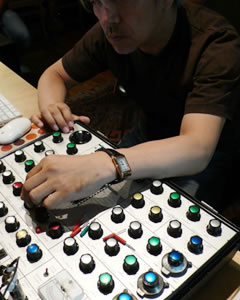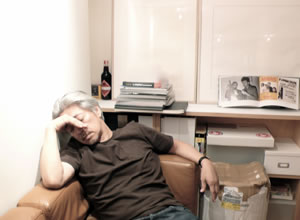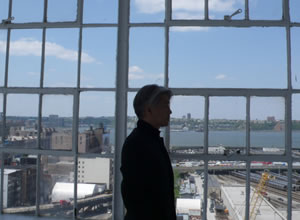
Question 01
[Question theme: "God" and "brief"]
I'm 32 years old now, and by the time Prof. Sakamoto was already minded, the world was treated as a deified person.
Meanwhile, when I was a high school student, I was watching "Gottsue feeling" in the downtown area, and Professor Sakamoto was on the Comte.
I remember it was a control called "Ahoahoman".
Moreover, in the dirty briefs, I was shocked by the production that Hamada-san was willing to give up, and without compliment, ``I am such a person who has such a reputation, but it is such a cool person to do such a thing'' I thought.
When Professor Sakamoto received the request for that work, I would like to know what you thought about and how you received it.
Thank you.
Music production men in their thirties
Professor answer:
Certainly there were some revenge from downtown after the release of "Geisha Girls".
Even in "The use of brat or hell!!", Narita arrived and entered the recording venue immediately, and he was covered with a vulgar and made a manzai in a bukkake production ....
I think it was one of them.
It means "let's stand!"
Basically, "playfulness" is not a hate...
By the way, it is one of the episodes of "I like comedy", but there was "Wasabi Sushi Roulette" in the punishment game when I appeared in YMO on Tonneluzu's "Moji Mojikun".
It is said that "Wasabi" is prepared in a lot of Nigiri sushi.
Two people of Tonneluzu and three of YMO received "grip" one after another.
Then, the one I ate was "wasabi sushi", but I ate it deliciously normally without realizing it.
When Mr. AD flew in and said, "Sakamoto-san ate "wasabi"", the studio burst into laughter.
In the OA, the scene of actually eating "wasabi sushi" was introduced with a caption.
In the episode of "Ahoa Hoh Man," a prop from a TV station brought the briefs of the costumes "dirty" to the dressing room, but he said, "It's not such a dirty stain, lend it to me". I took it up and got dirty and got into joy.
When I witnessed the recording, the high-ranking members of the label that I belonged to at the time and the great people on the TV station were all surprised and returned home.
Both of us in downtown really pulled out, so I was happy to say "I won!"
Last but not least, I don't really understand recent Japanese comedy.
The only thing I'm looking forward to on cable TV in NY is "smiles".
It's already crazy, so don't book a comedy show job.
Question 02
I am interested in your childhood as a professor!
I've heard that you first composed songs when you were in kindergarten. Did your professor love going to kindergarten?
What kind of play did you play at that time?
If you have any episodes of memories, please let us know.
HR 30s female
Professor answer:
That's right. I composed for the first time in kindergarten.
I was supposed to make a song for the animals that I took care of during the summer vacation in the fall.
I wonder if the title was "Rabbit Song".
I think it was a simple one with the feeling that "the rabbit's eyes are red".
Unfortunately there is no score left.
I really liked kindergarten.
I especially liked drawing on the window glass.
Although I was a child, I had the feeling of breaking taboos (contraindications) and I was thinking, "Is this something I should do?"
One day, on the way back from kindergarten, I went to Shibuya to watch a movie with two of my friends, but it was discovered and it was a big deal.
I heard that even in kindergarten, he said that he should never do anything like Sakamoto-kun even afterwards.

Ryuichi Sakamoto July, 2008/NY
"Are you preparing for the album?"
Question 03
Not only Ryuichi Sakamoto, but various organizations are actively engaged in eco-promotion activities. Who are you targeting?
I think that not only Japan but also Britain, the United States, and South Korea have widened disparities, and the problems facing the country are food, energy, and economic weakness.
In terms of number of people, I think that more people than rich people live in an environment where today's lives cannot survive.
With so many Japanese people living in a state of life where they can't think about eco, who is the target of this ecology activity?
Contract management Women in their 20s
Professor answer:
I can't give you a clear answer, because who is targeting the eco-organizations that I am not involved with will depend on the purpose of the establishment of the organization and what the goal is.
Since environmental problems are problems of the earth, which is the only place where human beings live, they affect both rich and poor people alike.
In that sense, the target is the entire human race.
However, there is a view that the poor are more affected by environmental problems, and in that sense, I would like the world's poor to become more aware.
Also, from a different perspective, it is possible to say that the target is the wealthy class because it is the rich class who can afford to deal with such problems easily.
Question 04
I've heard that people say "eco is ego". What does that mean?
Manager 40s woman
Professor answer:
As you all know, I'm not a perfect person at all.
I use electricity every day and I also ride cars and planes.
It can even make the cooler stronger when it's hot. (I'm careful not to do that...)
Also, since I make music and do business with it, I also emit a lot of greenhouse gases.
However, I don't think it's okay to ignore the issue of global warming, and I don't think we can't do eco-promotion activities.
I often talk in interviews, etc., but I think that "eco is ego."
I don't want to breathe clean air, drink delicious water, or even die in a scorching hell.
When my children grow up, it would be a problem if this planet was a place where they could not live.
But unfortunately, no matter how rich I am, I can't say, "I want to buy a good environment just for myself and my family."
In order for me to live comfortably, I am in trouble unless I have other people think and act properly.
Above all, you can't enjoy music or art without an environment where people can live.
I don't want such a sad thing to happen.
Question 05
What does life mean to a professor?
Director 40s male
Professor answer:
I deal with anything on the fly.
Of course, there are some failures, but I've had a good time as a whole.
I don't know what will happen in the next moment, and at that time I call it "Ce la Vie".
In other words, the plan is useless.
That's what life is to me.

Ryuichi Sakamoto July, 2008/NY "A little tired"
Question 06
I've been listening to Sakamoto's music since I heard BTTB 10 years ago.
Above all, "aqua" is "the song that made me tears when I heard the instrumental song."
(If it's a song with lyrics, it may happen that "I sympathize with the lyrics and tears"...)
I would like to hear the production episode about how a song called "aqua" was created that can make you cry with just a melody.
Planning Promotion Women in their 30s
Professor answer:
"Aqua" was written when I made my daughter's debut album, Miu.
It was good, so I covered the song myself and released it first.
Question 07
I usually get irritated by work and relationships, but at that time, I would like to know if there is a stress relieving method recommended by the professor.
Female in 30s
Professor answer:
As I just saw in the news today, calm people are 30% more likely to have a "myocardial infarction" than angry people.
Until I was 56 years old, I never really met a "gentle person or meek person".
This has been scientifically proven.
Gentle people just put up with it.
That makes me more stressed...
Stress is something you can't save.
Find your own way.
By the way, my way to relieve stress is to eat.
Question 08
I think the music business is currently in a slump.
Although the number of songs downloaded is increasing, sales of CDs are declining and a major US record maker is also merging. It is said to be in a global crisis.
In such a situation, what is Sakamoto thinking about the global music business?
Also, if you have any future prospects or advice, please tell us.
Video production Male in his 20s
Professor answer:
Originally, when the medium called CD appeared in the 1980s and music was digitized, the current situation could be predicted.
At that time, I once suggested to Sony (electric) that "a music kiosk should be made and music should be sold only by digital information transfer."
At that time, CDs would not have become popular if there was an internet infrastructure as it is now.
CD is a medium of "transitional period" until the Internet appeared.
Even in Japan, where PC penetration is lower than in the West, the majority of CD packages will disappear in the next couple of years. On the other hand, focusing on human's "attachment to things", I think that CDs (discs including Super Audio CDs) will survive unexpectedly for a long time as "media that supports high value-added products."
"Schola" released from commmons that I am doing is also in that position.
We will produce it as a product that will be passed down through generations.
Gone are the days when music couldn't reach the masses without a major record company.
From the standpoint of the creator or user, I think it's great that the variety of music can be distributed easily and conveniently.
However, from a musician's point of view, life will only be achieved if the audience buys the work.
If more music is copied for free and less money flows into the music industry, then talent and talent will not flock to this industry. In the future, I'm afraid that talent may flow to other fields and the music industry as an industry may disappear.
As I heard from people, it seems that many young Japanese people also throw away music downloaded to their mobile phones such as "Chaku-Uta Full" when changing mobile phones.
It's a symbolic story, but music has become a "consumer good" and hard to exist as a "cultural property."
Before the 20th century, aristocrats and churches (countries), and in the 20th century, the masses paid money to musicians to become patrons, and music culture developed, but at least the 20th century model was about to collapse. think.
First of all, you should immediately break away from the business model that relies on CD sales.
The industry will collapse in the business structure of mass-producing/producing and distributing music to media such as CDs.
On the other hand, if you go out into the city, music is flooding.
In other words, there is a listener.
The role as a medium connecting "music" and "listeners" may rather increase.
You can call it an "agent function".
The “publicity function” will also become more important.
The “label” will become a brand, and the brand will also function as a “select shop”.
Such movements have already become active in Europe and the United States, and new business models known as Last.fm, which take advantage of the technical characteristics of the Internet, are emerging.
In Japan, the old legal system, including the copyright law, and the existence of copyright adjoining copyright holders also hinder such movements. Therefore, from the standpoint of the creator and user, protect the author in a true sense. You will also need a system/legal revision that allows you to do so.
Question 09
What kind of conversation do you usually have with your daughter, Miu Sakamoto?
Accounting 20s Female
Professor answer:
I don't remember much.
I talk about cats.
I was once introduced to my boyfriend.

Ryuichi Sakamoto July, 2008/NY "Between KOKUYO advertisement photography"
Question 10
I love battle meli. What kind of situations did you make?
Product Planning Women in their 40s
Professor answer:
Sit in front of the piano and do it normally.
However, I didn't remember how I made it, and when I realized it, it was done. Sometimes that is the case.
